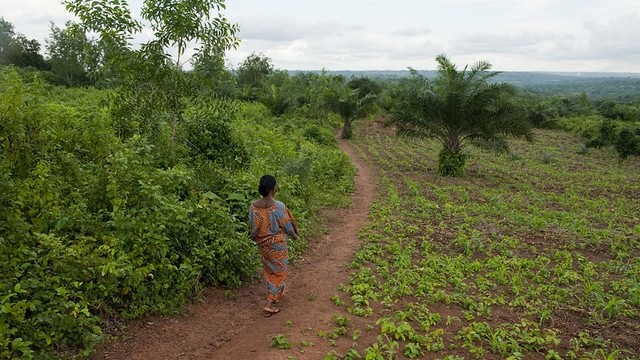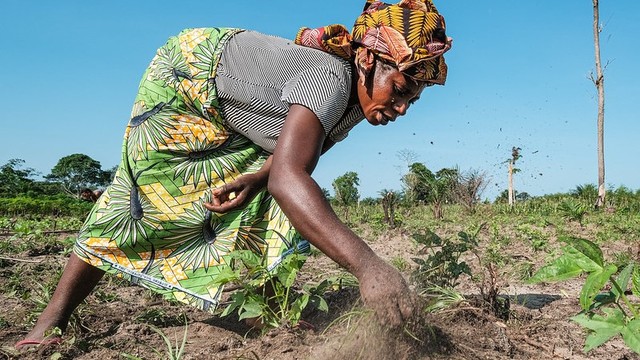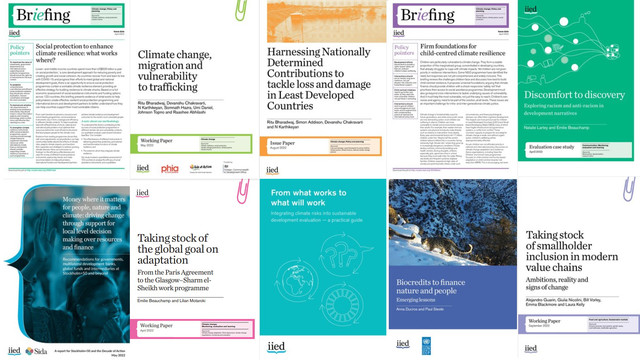IIED's best of 2021: blogs
As 2021 draws to a close, we're showcasing some of the content we've published during the last 12 months. Our blogs offer a place for IIED staff and guest authors to share their personal views and experiences – and were viewed more than 400,000 times. In case you missed them, here are our top 10 most-read blogs of the year.

Farmer in Tintilou village, Burkina Faso (Photo: Ollivier Girard/CIFOR via Flickr, CC BY-NC-ND 2.0)
1 Here's why Indigenous economics is the key to saving nature
April: Our most read blog of the year saw principal researcher Krystyna Swiderska argue how mainstream Western economics is destroying the environment and the Indigenous knowledge that has conserved nature for millennia.
Ironically, the same Indigenous economies that have conserved and enhanced biodiversity for millennia are now threatened by environmental policies that often fail to recognise the value of Indigenous knowledge, thus contributing to its erosion.
2 Life and livelihoods: the impact of COVID-19 on small-scale fishing communities
In many developing countries, value chains for dried small fish are important, and most lie in the informal sector dominated by rural women, who were highly affected by [COVID-19] restrictions on movement.
3 Locally-led adaption to climate change: the start of a 10-year learning journey
January: In early 2021, a fast-growing group of experts met to define a 10-year learning agenda to advance principles for critical locally-led adaption to climate change. Saleemul Huq and Clare Shakya wrote about the importance of this group and the journey ahead.
This 10-year journey to promote locally led adaptation will use three annual events to keep partners – both individuals and their organisations who have committed to improving practice behind the principles – to stay engaged. Together, these events will enable a community of practice to grow that will demonstrate the role and value of locally led action.
4 Nature-based solutions: building blocks for green recovery and climate action in least developed countries
August: The economies of least developed countries (LDCs) are heavily reliant on natural resources. It is therefore no surprise that they are leading the way in calling for actions that address the loss of nature together with climate change. In this blog, nature and climate policy lead Ebony Holland shared research outlining how nature-based solutions are being placed front and centre by LDCs.
The majority of nature-based solutions identified, if done well, have the potential to deliver significant benefits for climate, nature and people.
5 Reducing urban poverty – lessons not learnt?
August: Around one billion people are residents of informal settlements and tenements in urban areas in the global South, with most living in poor and overcrowded conditions lacking access to basic services. In this blog, IIED’s senior fellow David Satterthwaite and research associate Diana Mitlin discuss what have we learned from over five decades of initiatives meant to reduce urban poverty, and what benefits have been felt by the residents.
Recognising the importance of what city and municipal governments can do to support poor residents and address poverty – and the importance of what urban poor groups can do (individually and collectively).
6 Putting gender, intersectionality and social justice at the centre of transformative responses to climate change
May: In this blog, principal researcher Tracy Kajumba and climate change director Clare Shakya point out that if we want a more equal and socially-just society, we need a radical new approach, starting with the way we respond to climate change.
Transforming power relations requires addressing the barriers that affect different categories of people across the intersectionality spectrum. Focusing on one group narrows the view of inequalities, excludes other categories, but also fails to challenge the privileged positions and structures that perpetuate inequality.
7 Community-led COVID-19 response: an update from the Philippines
July: Guest bloggers Ruby Papeleras and Migo Gaddi highlighted the action of the grassroots organisation Homeless People’s Federation of the Philippines in its fight against COVID-19 helping people survive. They also discussed case studies of what had been done in the cities of Davao and Talisay.
The young people mapped out the most vulnerable families, and organised drives to receive, store and distribute donated food to where it was most needed
8 Fire disaster makes more than 1,000 homeless in Freetown
March: A fierce fire hit Susan’s Bay, Freetown in Sierra Leone earlier in the year. Guest bloggers Joseph M Macarthy and Mary S Kamara from Sierra Leone Urban Research Centre discussed the insecurity and lack of access to basic services faced by residents of Sierra Leone’s informal settlements.
Although the cause of the fire remains unknown, poor electrical installations or the extensive use of fire for outdoor cooking are most likely at fault.
9 Mining cobalt better
September: While the post-COVID-19 world looks at ‘building back better’, little has changed for artisanal cobalt miners in the Democratic Republic of Congo (DRC). Abbi Buxton, associate in IIED’s Natural Resources research group, writes in this photoblog about nascent efforts to improve the sector while failing to drive the broad based societal and environmental change envisaged by the ‘building back better’ agenda.
Miners, both male and female, need also to be more effectively represented within local cooperative structures that are currently seen as a primary instrument in the drive towards formalisation.
10 Five key questions for making the Global Goal on Adaptation work for local people and places
July: While the Paris Agreement sets clear milestones for driving collective action on adaptation, parties still need to address several thorny issues. In this blog, senior researcher Emilie Beauchamp discusses how parties to the Paris Agreement could agree on a roadmap towards a Global Goal on Adaptation (GGA) that will work for the whole of society.
The GGA must be based on an understanding of what resilience means for individual countries. So parties must think according to their local realities: how will the GGA inform and direct actions and funding to make people and places in their countries more resilient?
That's our top 10 – but there were many more! To see all our 2021 blogs, visit our News and Comment page.
Previous years
Click on the year to see IIED's most read blogs for the last five years: 2020; 2019; 2018; 2017; 2016



